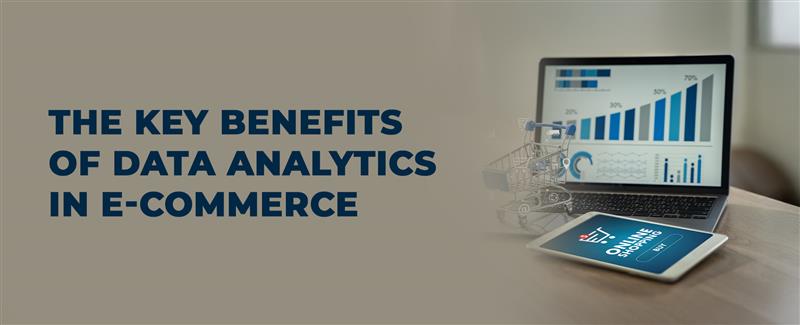The Key Benefits of Data Analytics in E-Commerce
28 Dec 24 


The e-commerce industry has become a data-driven ecosystem where every click, purchase, and customer interaction generates invaluable insights. This influx of data, can be overwhelming, which is why data analytics has become a cornerstone for businesses looking to harness this potential. By using advanced analytics tools to process, interpret, and utilize data, e-commerce companies can make informed decisions, improve customer satisfaction, optimize operations, and ultimately, boost profitability. This article will explore how data analytics is reshaping the e-commerce landscape and the wide range of benefits it offers to businesses in this sector.
What is Data Analytics in E-Commerce?
In the context of e-commerce, data analytics refers to the systematic process of collecting, processing, and interpreting large sets of data to extract meaningful insights that inform business decisions. Using various techniques like predictive analytics, machine learning, and real-time data processing, businesses can gain deep insights into customer behavior, operational performance, market trends, and more. This enables e-commerce businesses to optimize their operations and strategies in a dynamic and competitive market.
E-commerce analytics spans several areas, including customer analytics, marketing analytics, and operational analytics. By integrating these areas, companies can create a cohesive and responsive ecosystem that adapts to changing customer behaviors and market dynamics. The resulting insights help businesses drive growth, improve customer experiences, and remain competitive in an increasingly data-centric world.
Also read What Will E-Commerce Look Like in 2025?
Key Benefits of Data Analytics in E-Commerce
Enhanced Customer Experience
Customer experience is the foundation of e-commerce success. With the help of data analytics, businesses can deliver personalized, seamless, and efficient experiences that keep customers coming back. Key ways in which data analytics contributes to enhancing the customer experience include:
- Personalized Recommendations: Data analytics enables e-commerce businesses to recommend products that match a customer’s previous browsing and purchase behavior. For instance, Amazon’s recommendation system, powered by data analytics, is responsible for approximately 35% of its total revenue. By analyzing past purchases, search history, and customer preferences, businesses can offer targeted product suggestions that increase the likelihood of conversions.
- Optimizing User Journeys: Analytics tools allow e-commerce businesses to track customer interactions across the website or app. By understanding where customers drop off, which pages have the highest bounce rates, or where customers are encountering difficulties, businesses can optimize the user journey to remove friction points and ensure a smoother experience. This leads to increased engagement and better conversion rates.
- Anticipating Customer Needs: Predictive analytics enables businesses to forecast customer needs, ensuring timely responses to market demands. For example, if a product is nearing a stockout based on high demand or seasonality, analytics can trigger restocking efforts or suggest related products, maintaining customer satisfaction and sales volume.
Optimized Inventory Management
Efficient inventory management is crucial in e-commerce, where demand fluctuations and fast delivery expectations put pressure on businesses. Data analytics helps businesses avoid the pitfalls of overstocking or understocking, leading to:
- Accurate Demand Forecasting: Historical sales data, seasonal trends, and external factors (like holidays or special events) can be analyzed to predict future demand accurately. his helps businesses stock up on the right products at the right time, reducing the chances of overstock or stockouts. By integrating Firebase SQL for data storage and retrieval, businesses can enhance their forecasting accuracy and make informed decisions based on real-time insights.
- Minimizing Overstock and Stockouts: Real-time inventory tracking systems, powered by data analytics, enable businesses to monitor stock levels, sales trends, and demand patterns in real-time. This helps prevent stockouts, ensuring customers can always find what they need. At the same time, it prevents overstocking, which could lead to unnecessary storage costs or markdowns.
- Streamlined Supply Chain Management: Analytics helps optimize supply chain processes by providing visibility into supplier performance, order cycles, and logistics efficiency. This leads to better coordination, cost savings, and fewer delays in getting products to customers.
Dynamic Pricing Strategies
In the highly competitive e-commerce world, pricing plays a vital role in a business’s ability to attract customers and stay profitable. Data analytics allows e-commerce businesses to implement dynamic pricing strategies that adapt to changing market conditions. These strategies include:
- Dynamic Pricing Models: Data analytics enables businesses to adjust their pricing based on various factors such as demand, competition, customer preferences, and market trends. This helps ensure that prices remain competitive and reflect real-time market conditions. For example, Uber uses dynamic pricing (often called surge pricing) to adjust fares during peak demand periods.
- Understanding Price Elasticity: By analyzing how customer demand changes in response to price adjustments, e-commerce businesses can determine the optimal price points for different products. This enables businesses to maximize revenue while staying within customer expectations.
- Competitive Price Monitoring: E-commerce businesses use data analytics to track competitor prices and promotions. By continuously monitoring competitors, businesses can adjust their pricing strategies in real time, ensuring they stay competitive in a crowded marketplace.
Higher Marketing ROI
Data analytics helps e-commerce businesses increase the efficiency and effectiveness of their marketing campaigns. By leveraging customer data, businesses can tailor marketing efforts to specific audience segments, resulting in higher returns on investment (ROI). Key benefits include:
- Effective Customer Segmentation: Analytics allows businesses to categorize their customer base into segments based on various criteria, such as demographics, purchase history, browsing behavior, or customer lifetime value. This segmentation enables businesses to create targeted marketing campaigns that speak directly to the unique needs and interests of each group.
- Real-Time Performance Analysis: Analytics tools provide real-time insights into how marketing campaigns are performing. Whether it’s an email marketing campaign, a social media ad, or a paid search effort, businesses can track key performance indicators (KPIs) like click-through rates, conversion rates, and customer acquisition costs. This allows businesses to fine-tune campaigns in real time and optimize spending for maximum impact.
- Retargeting Opportunities: Data analytics helps businesses identify customers who may have abandoned their shopping carts or shown interest in specific products but didn’t complete a purchase. With retargeting, businesses can reach out to these potential customers with personalized ads or incentives, increasing the likelihood of conversion.
Improved Conversion Rates
One of the ultimate goals of any e-commerce business is to convert visitors into paying customers. Data analytics plays a crucial role in identifying opportunities to increase conversion rates:
- A/B Testing: A/B testing is a powerful tool that allows businesses to compare different versions of web pages, calls-to-action, or checkout flows to see which performs best. Data analytics helps determine the most effective designs, layouts, and content, ultimately leading to higher conversion rates.
- Behavioral Insights: By tracking user behavior on websites or apps, businesses can identify areas where customers may be experiencing friction or abandoning their shopping process. This could include long load times, complicated checkout processes, or confusing navigation. By addressing these issues, businesses can streamline the user experience and increase conversions.
- Automated Triggered Actions: Analytics tools can automate actions based on customer behavior. For example, if a customer abandons their cart, the system could automatically send an email reminder with a discount or a message encouraging them to complete their purchase. These personalized interventions increase the likelihood of conversion.
Fraud Detection and Prevention
Fraud remains a significant threat in e-commerce, costing businesses billions of dollars each year. Data analytics provides businesses with the tools they need to detect and prevent fraudulent activities:
- Anomaly Detection: Using machine learning and AI algorithms, businesses can detect unusual patterns of activity that may indicate fraudulent behavior. For instance, multiple high-value transactions from the same IP address or an unusually large number of failed login attempts could trigger a fraud alert.
- Enhanced Security: Data analytics also helps businesses improve their security measures. By analyzing transaction data in real time, businesses can spot potentially fraudulent activities and block them before they cause damage.
- Real-Time Monitoring: Real-time data analysis helps businesses monitor transactions and payments as they occur. This allows businesses to flag and investigate suspicious transactions immediately, reducing the risk of fraudulent chargebacks and financial losses.
Smarter Decision-Making
Data analytics allows businesses to make more informed, evidence-based decisions, which is crucial in today’s fast-paced and competitive e-commerce environment. Key benefits include:
- Comprehensive Dashboards: Business intelligence tools consolidate metrics such as sales figures, inventory levels, and customer behavior into easy-to-read dashboards. This provides business leaders with a holistic view of operations, allowing for data-driven decisions that align with organizational goals.
- Predictive Insights: Advanced analytics tools can simulate various business scenarios based on historical data and predictive models. By anticipating future trends, such as seasonal demand or changes in customer behavior, businesses can proactively plan for potential challenges and opportunities.
- Strategic Planning: Data analytics helps businesses identify areas for growth, such as new product lines, target markets, or marketing strategies. By analyzing historical performance and market conditions, businesses can make strategic decisions that set them up for long-term success.
Improved Customer Retention
Retaining customers is often more cost-effective than acquiring new ones. Data analytics helps businesses keep customers engaged and loyal by providing valuable insights into customer behavior:
- Churn Analysis: By analyzing customer behavior, businesses can identify patterns that may indicate a higher likelihood of churn. These insights allow businesses to implement retention strategies, such as personalized offers, loyalty programs, or proactive customer service.
- Personalized Loyalty Programs: Analytics enables businesses to design loyalty programs that cater to the individual preferences of customers. By offering rewards that are meaningful to customers, businesses can encourage repeat purchases and strengthen brand loyalty.
- Sentiment Analysis: Data analytics tools can monitor customer reviews, social media mentions, and feedback to gauge customer sentiment. By understanding how customers feel about their products and services, businesses can address concerns quickly, preventing negative reviews and enhancing customer satisfaction.
Real-World Examples of Data Analytics in E-Commerce
| Company | Application of Data Analytics | Impact |
| Amazon | Personalized product recommendations | 35% revenue generated by recommendations |
| Netflix | Content recommendations based on viewing history | Reduced churn and increased engagement |
| Walmart | Demand forecasting and inventory optimization | Reduced stockouts and increased sales |
| Alibaba | AI-driven dynamic pricing strategies | Enhanced profitability and competitiveness |
Challenges in Implementing Data Analytics
While the benefits of data analytics are immense, businesses must overcome several challenges to implement it effectively:
- Data Privacy and Compliance: Adhering to regulations like GDPR and CCPA is critical to ensuring customer trust and avoiding legal repercussions.
- Integration Complexities: Integrating data from multiple platforms, such as e-commerce websites, social media channels, and third-party analytics tools, can be resource-intensive and require specialized skills.
- High Costs: Advanced data analytics tools and the personnel to operate them often require substantial investment, which may be a barrier for small businesses.
Emerging Trends in Data Analytics for E-Commerce
As technology continues to evolve, new opportunities for data analytics emerge. Key trends include:
- Artificial Intelligence and Machine Learning: These technologies are being integrated into analytics platforms to improve prediction accuracy, automation, and personalization.
- Real-Time Data Processing: Instantaneous insights allow businesses to respond to customer behavior in real time, offering more agile responses to market changes.
- Predictive Analytics for Supply Chains: With advanced predictive models, businesses can proactively address supply chain disruptions, reducing risk and improving efficiency.
- AR and VR Data Integration: As augmented and virtual reality continue to grow in e-commerce, analytics will increasingly incorporate AR and VR data to offer richer insights into customer preferences and behavior.
- Voice and Visual Search Analytics: With the rise of voice assistants and image recognition, businesses are leveraging analytics to refine their search capabilities and tailor product offerings based on these emerging trends.
Conclusion
Data analytics is transforming the e-commerce industry by providing businesses with the tools they need to make informed, data-driven decisions. From improving customer experiences and optimizing inventory to implementing dynamic pricing strategies and enhancing marketing ROI, the benefits are profound. As technology advances and more businesses embrace data-driven strategies, data analytics will continue to play a critical role in helping e-commerce companies grow and thrive in a competitive landscape. Utilising the full potential of data analytics is no longer optional for e-commerce businesses—it’s essential for long-term success.
- Agentic AI1
- Android Development3
- Artificial Intelligence35
- Classified App3
- Custom App Development5
- Digital Transformation12
- Doctor Appointment Booking App14
- Dropshipping1
- Ecommerce Apps40
- Education Apps2
- Fintech-Apps37
- Fitness App4
- Flutter4
- Flutter Apps20
- Food Delivery App5
- Grocery App Development1
- Grocery Apps3
- Health Care10
- IoT2
- Loyalty Programs9
- Matrimony Apps1
- Microsoft1
- Mobile App Maintenance2
- Mobile Apps130
- Product Engineering6
- Progressive Web Apps1
- React Native Apps2
- Saas Application2
- Shopify9
- Software Development3
- Taxi Booking Apps7
- Truck Booking App5
- UI UX Design8
- Uncategorized6
- Web App Development1



















Comments